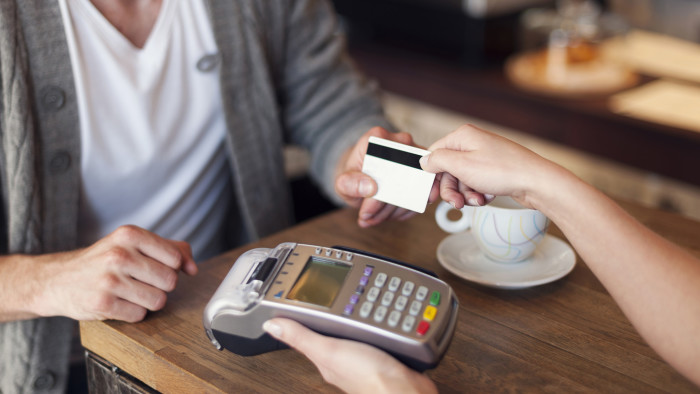A crusade for better contactless card etiquette

Roula Khalaf, Editor of the FT, selects her favourite stories in this weekly newsletter.
I’m stuck in a contactless payment stand-off. Again.
Only moments ago the woman behind the counter had handed me a flimsy takeaway container best held by the overheated pasta end rather than the salad side. Now she’s removed a shoe-sized payment terminal from its cradle next to the till. She’s holding it aloft with one hand while the other reflexively reaches towards the contactless-enabled debit card I’ve pulled from my jacket pocket. Only I’m not handing it over. Too many times has my card been tapped without me getting to check the amount. I feel duped when that happens and most days I’m grumpy enough to try to prevent it. This is one such day.
The conversation the woman is having with a colleague — stage left, serving another customer — starts to fizzle out. Now she twitches in my direction, checking to see whether I’ve figured out how to function as an adult yet. It’s past 3pm and I’m starving. I delayed lunch to prepare for a meeting that’s in 20 minutes. But today, in my crusade for better card etiquette, I am not blinking first.
Guidelines for retailers accepting contactless payments, as issued by the UK Cards Association, state: “The card or device should always stay in the customer’s hand (or on their person in the case of wearables), and both you and the customer should follow the terminal prompts.” This is not what tends to happen, though.
Instead, it has become increasingly common, especially in the past year, for a proffered card to be used in a contactless transaction, sight unseen, and simply handed back. Like, “Don’t worry, I took the right money out of your wallet for you!”
This feels like suddenly stepping on level ground when you expected the staircase to have at least another couple of steps. It isn’t like fintech disrupting a big, bad bank here. I don’t like being disintermediated from the process of my money being spent. I want to experience it and to check the amount, all right?
Like most people, I was previously programmed to hand over my card automatically. But this was on the expectation that the terminal, with the card inserted, would be passed back so I could check the amount, type in the pin and hit the green button to accept.
When contactless was introduced, the novelty of being able to tap to pay for lunch or coffee was enough to have us all staring at the terminals together to see if the frictionless money magic would work. Now, with the issuance of enabled cards in the UK at more than 87m, and one in every seven transactions made using contactless, the initial curiosity is gone. The number of terminals that can take these payments has doubled in two years. That’s 354,825 possible locations for stand-offs of the kind I’m currently engaged in.
One strategy I’ve heard of — to forcibly reinsert oneself into the process — is to extend a card while the lower half of it is still in your wallet. Brave is a cashier who tries to grab at that.
I tend to be more direct. As is the case with my late lunch. I point at the terminal and ask: “Does it have contactless?” The usual reply comes with more card-grabbing motions: “Yes.” A pause with a stare, then the cashier asks: “Can I use it?” Keeping the card in hand, while leaning, awkwardly and with intent, as far forward as I can, I reply: “If I can see the terminal, sure.” It’s probably the invasion of personal space that achieves the desired effect of bringing the terminal within readable distance.
There are, of course, some places that already get it right every time. A café near Financial Times headquarters, probably the greatest contributor to our journalists’ caffeine levels, is like this. It serves to show that managers — or, indeed, the terminal providers — should be perfectly able to insist that the guidelines are followed.
There is also Apple Pay to consider, as well as the Android version that arrived in the UK last month. Few shop staff, if any, would dare grab a phone to take a contactless payment. But using this would mean I’d have to get over the creepiness of my bank, browser, mobile operating system, email account, photo back-up and search engine all getting into bed with each other.
Just hand over the terminal, please.
lisa.pollack@ft.com
Twitter:
@LSPollack
Comments